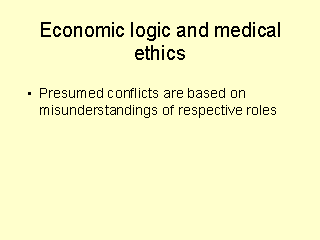 |
Health economics is a logic framework which allows us to reach
conclusions about the best way resources can be allocated, i.e..
the way which will lead to greater social benefit. We do not
believe that any health care worker can have misgivings about
this general aim, given that our mission, after all , is to
promote health and alleviate suffering. Equally, the possible
tension with so-called clinical freedom does not appear to be
an insoluble one. Clinical freedom is the faculty of choosing
the best intervention for a patient, based on one's knowledge.
This choice however is always tempered by knowledge of what
resources are available. For instance, we are unlikely to achieve
the complete disappearance of waiting lists for non-emergency
hospital admissions such as hip replacement. Therefore, for patients
who require it, reassurance and interim treatment such as pain-killers
and physiotherapy are an acceptable alternative (for both patients
and doctors) to immediate admission. Equally, widely accepted
practices, such as triage, are based on the need to use resources
efficiently.
Economic logic fits into reality easily as it is one more tool
that health care workers can employ in order to make such decisions,
its only difference is that it makes such choices explicit. Most
health care workers welcome explicitness in decision-making.
|
